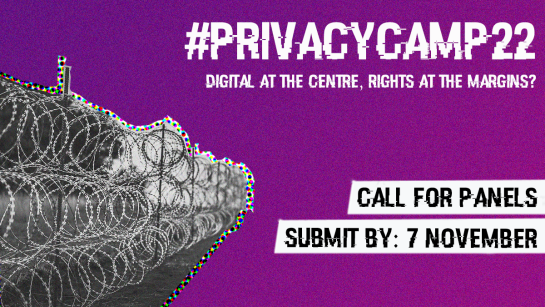
This year the Privacy Camp celebrates its 10 years of activity, and for its 10th edition invites for a forward-looking retrospective on the last decade of digital rights. This edition of the Privacy Camp aims at building on the lessons of the past and at collectively articulating strategic ways forward for the advancement of human rights in the digital society.
To do so, the Privacy Camp calls for solution-oriented panel proposals around the following themes.
1 - Putting rights at the centre of digital policies
Too often, rights are an after-thought of digital policies. In the past decade we have seen again and again decision-makers decide first, and think about the impact on digital rights later. How can this be changed, to have future policy decisions getting rights right from the start, notably in relation to automated decision-making, the platform economy, data protection and privacy of communications, and the surveillance infrastructure?
In the context of this theme, the Privacy Camp welcomes proposals that tackle questions such as:
- What can we learn from national and EU debates around digital rights, that will be relevant for current and upcoming challenges?
- At EU level, has there been an evolution in terms of better integration of fundamental rights concerns into policy-making and socio-technical design?
- Has the changing role of EU institutions in relation to fundamental rights affected their approach to digital policy? Does it depend on the EU institution?
- Halfway through its term, how is the European Commission standing in terms of digital rights and policies?
- How do debates about EU digital policies intersect with the power of Big Tech and national states?
- How to make sure that rights remain a central priority when legal instruments have been adopted and what is needed is to guarantee their effective enforcement (e.g. GDPR enforcement)?
2 - Bringing marginalised perspectives to the core of digital rights discussions,
The digital rights agenda was never neutral. It has been shaped over the years by a predominantly reactive approach to digital policy debates. Importantly, it also has its own dynamics dependent on a rather specific set of priorities. This means that some perspectives on digital rights, notably those coming from the point of view of marginalised people and communities, have been themselves marginalised. What are the voices and issues that have been left out, heard less, or simply not amplified enough?
In the context of this theme, the Privacy Camp welcomes proposals that tackle questions such as:
- How have digital rights strategies and approaches suffered from a limited perspective in the past?
- How can the digital rights community better centre the voices of people disproportionately affected by exploitative digitalisation, such as women, LGBTQI+ communities, racialised communities and people from the global south, people with disabilities, working-class people?
- What are the lessons learnt from creating broader coalitions with other actors such as workers’ unions, groups advocating for women rights, LGBTQI+ rights, anti-racism movements, or migrants’ rights defenders?
- What can we learn from how marginalised groups have been affected by digitalisation, and what effects have legal frameworks had to counter this disproportionate impact?
- How can we make sure that when we put rights at the centre of digital policies the concerns of marginalised people are given the necessary space?
- How might the digital rights field incorporate transformative justice and decolonial perspectives into its work?
Submission guidelines
- Indicate a clear objective for your session, i.e. what would be a good outcome for you?
- Include a list of a maximum of 4 speakers that could participate in your panel. Ensure you cover academia, civil society and decision–makers’ perspectives. Let us know which speaker(s) has/have already confirmed participation, at least in principle.
- Make it as interactive as possible and encourage audience participation.
- Support diversity of voices among panelists and strive for multiple perspectives.
- Note that the average panel length is 50 minutes.
-
To submit a proposal, fill in this form by 7 November 2021.
After the deadline, the staff at Privacy Camp will review the submissions and will notify the authors about the outcome of the selection procedure before 29 November. Please note that the Privacy Camp might suggest merging panel proposals if they are similar or complement each other.
About Privacy Camp
Privacy Camp is jointly organised by European Digital Rights (EDRi), Research Group on Law, Science, Technology & Society (LSTS) at Vrije Universiteit Brussel (VUB), the Institute for European Studies at Université Saint-Louis – Bruxelles (IEE at USL-B), and Privacy Salon.
In 2022, Privacy Camp’s Content Committee are: Andreea Belu (EDRi), Gloria González Fuster (LSTS, VUB) and Rocco Bellanova (IEE, USL-B).
Privacy Camp 2022 will take place on 25 January 2022 online.
Participation is free and registrations will open in December 2021.
For inquiries, please contact Andreea Belu at andreea.belu(at)edri(dot)org.
News contact
For suggestions/feedback concerning the LSTS website news section, please contact us.
